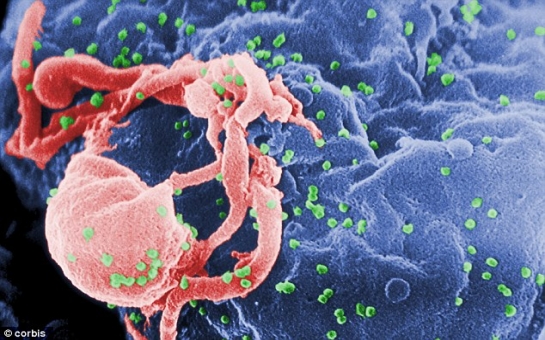Follow us !
Scientists discover radiation 'bomb' that could wipe out HIV
Society
19:20 | 05.12.2013

Scientists discover radiation 'bomb' that could wipe out HIV
For years, doctors have been treating HIV patients using anti-viral drugs, the effects of which can sometimes be mixed.Now a group of scientists in New York have tried seeing if using powerful doses of radiation - a radioactive smart bomb - might be more effective, and the results are very encouraging.Researchers found that in patients who were blasted with a combination of antiviral drugs and radiation, the treatment was even more effective and made the HIV virus became undetectable in the body.Dr. Ekaterina Dadachova, Ph.D., from the Albert Einstein College of Medicine in Bronx, New York is behind this pioneering research which investigated the ability of radioimmunotherapy to kill white blood cells infected with HIV.The radio active antibodies were also able to kill significantly more HIV-infected cells in the brain whilst doing less damage to the brains delicate systems.'Antiretroviral treatment only partially penetrates the blood brain barrier, which means that even if a patient is free of HIV systemically, the virus is still able to rage on in the brain, causing cognitive disorders and mental decline,' Dr Dadachova said in a statement. 'Our study showed that radioimmunotherapy is able to kill HIV-infected cells both systemically and within the central nervous system.'After 30 years of fighting the deadly and incurable virus, scientists think they may be able to find a way to really kill it.Earlier this week the White House and the National Institutes of Health announced a new, $100 million effort to try to find a cure.In the latest study, researchers tested a modified version of a therapy now used to treat leukemia on blood taken from 15 patients with HIV, and found evidence it could clean out infected cells.These so-called latent cells are the main reason that HIV cannot be cured – they lie low in the body, quietly resting until drug treatment stops, and then roar back into action.The team tried the new technique on 15 patients being treated for HIV.It killed the infected cells that were still circulating in the patients, and even penetrated into the brain – something that not many drugs can do.“The elimination of HIV-infected cells with RIT was profound and specific,” Dr. Dadachova said. “The radionuclide we used delivered radiation only to HIV-infected cells without damaging nearby cells.”The human immunodeficiency virus that causes AIDS infects 35 million people globally and has killed another 36 million, according to the United Nations.There’s no cure and experimental vaccines work only poorly.Drug treatment called antiretroviral therapy can keep the virus suppressed to such low levels that patients are healthy and much less likely to infect others.However, the virus always seems to remain in the body somewhere, and if the drug treatment is stopped, the cells usually start pumping out more virus again.Reservoirs of latently infected cells persist in the body, preventing the possibility of a permanent cure.In a few extremely rare cases, patients appear to have been cured.RIT, which has historically been employed to treat cancer, uses monoclonal antibodies- cloned cells that are recruited by the immune system to identify and neutralize antigens.Antigens are foreign objects like bacteria and viruses that stimulate an immune response in the body.The antibody, designed to recognize and bind to a specific cell antigen, is paired with a radioactive isotope. When injected into the patient’s bloodstream, the laboratory-developed antibody travels to the target cell where the radiation is then delivered.“In RIT, the antibodies bind to the infected cells and kill them by radiation,” Dr. Dadachova said. “When HAART and RIT are used together, they kill the virus and the infected cells, respectively.”'We found that radioimmunotherapy could kill HIV-infected cells both in blood samples that received antiretroviral treatment and within the central nervous system, demonstrating RIT offers real potential for being developed into an HIV cure,'Because the study was only conducted in blood samples and lab models, researchers say the next step is to test the treatment in clinical trials with humans.(dailymail.co.uk)ANN.Az










